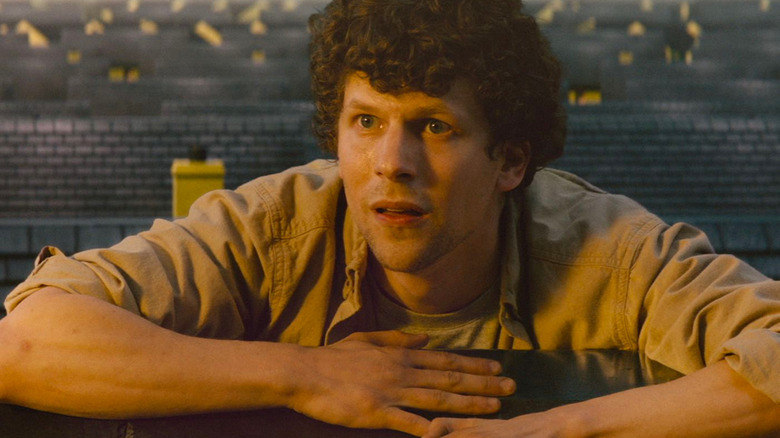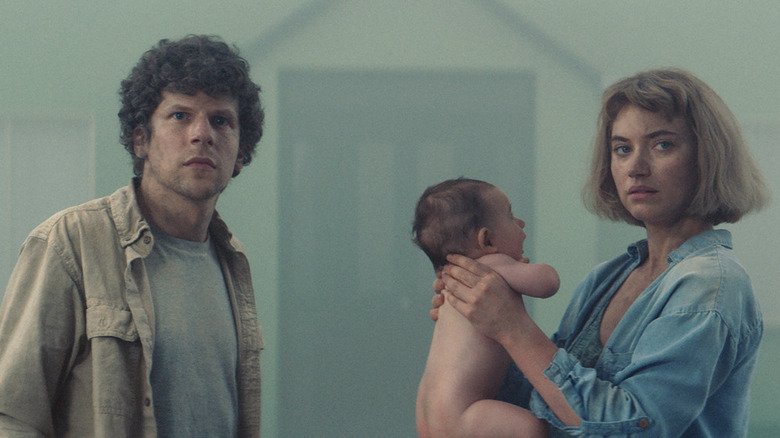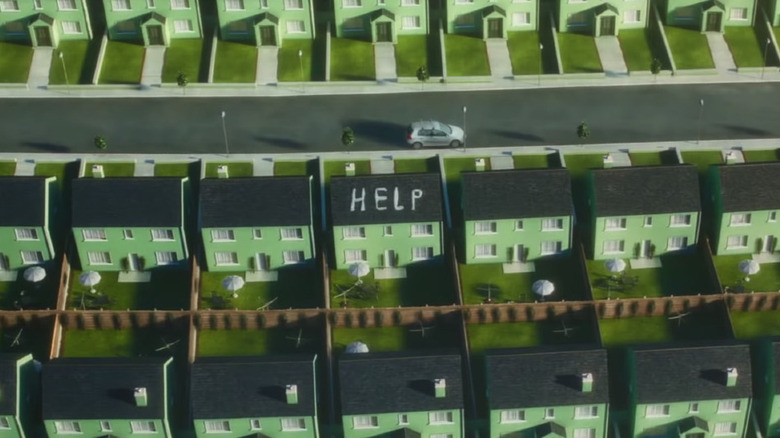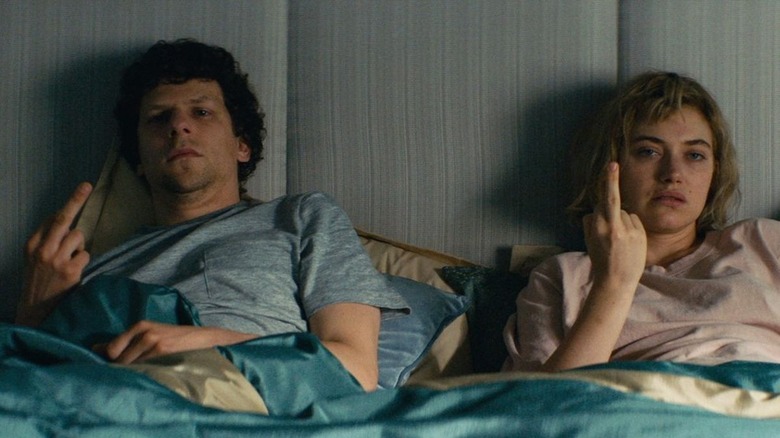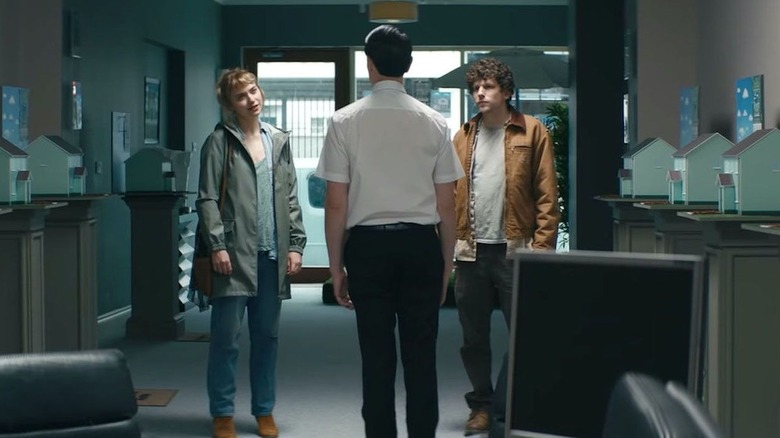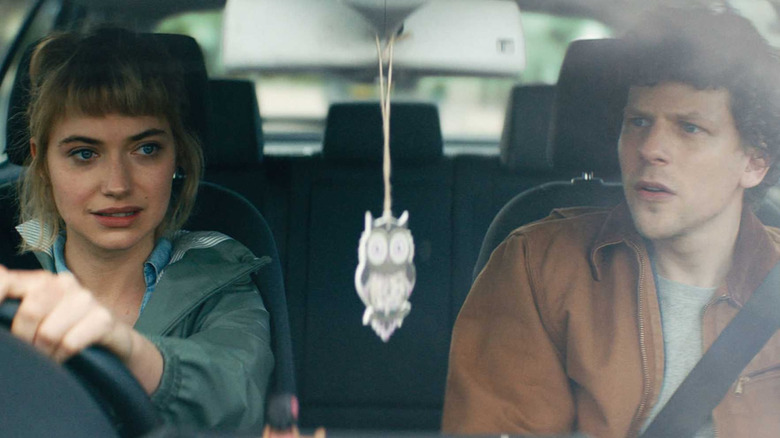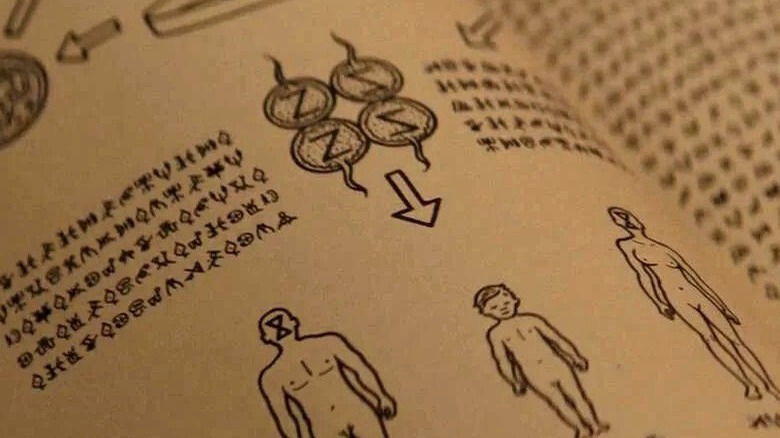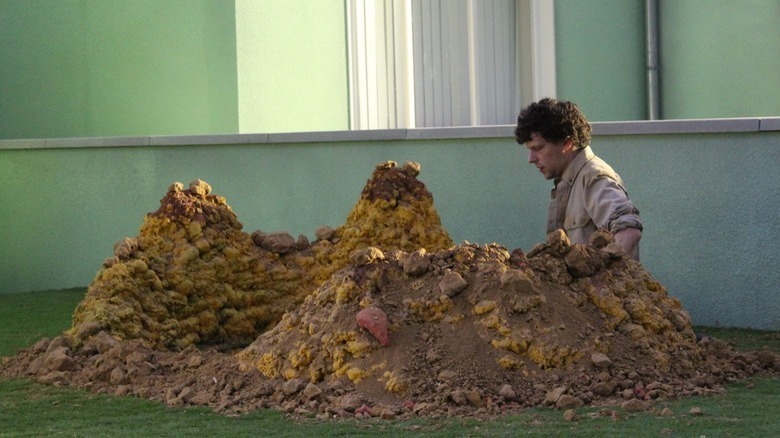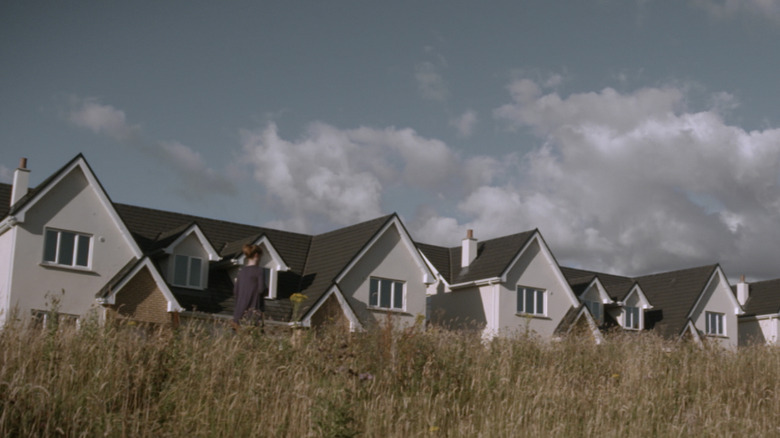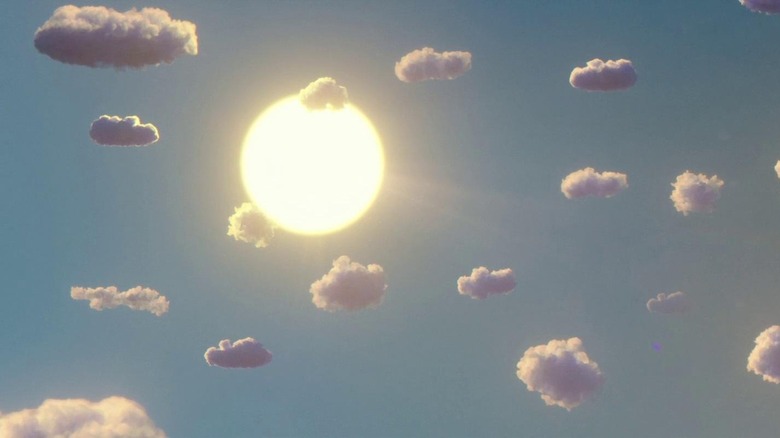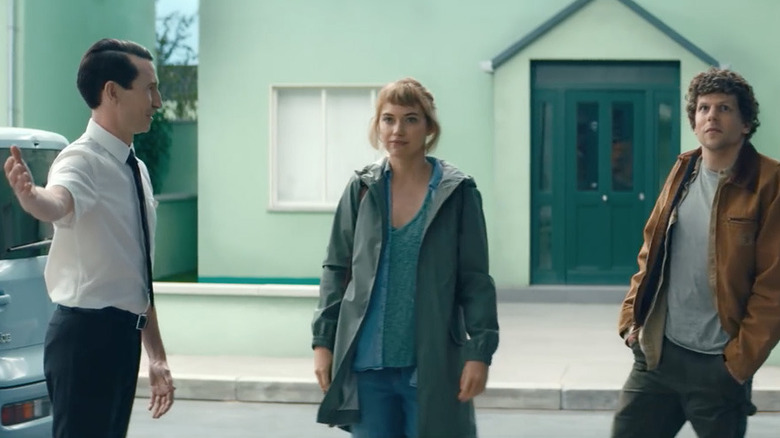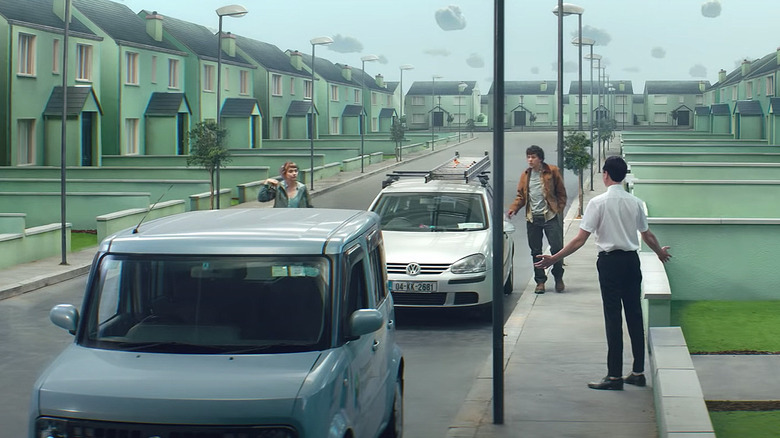Vivarium Ending Explained: It's Not That Complicated
The 2019 sci-fi thriller "Vivarium" has a clever premise but poor execution. The ending isn't really difficult to understand, but it does warrant some examination if only because humans are compelled to find meaning in all things, even if those things are ham-fisted sci-fi movies.
In "Vivarium," Tom (Jesse Eisenberg) and Gemma (Imogen Poots) are a young couple with no chemistry whatsoever. In hopes of buying a home, they're lured into a hideous suburban neighborhood by Martin, the world's worst real estate agent. The subdivision is called "Yonder," and it's made up of a seemingly infinite number of hideous green prefab homes. Martin vanishes in the middle of the house tour, and Tom and Gemma find themselves trapped in Yonder, unable to find — or even see — their way out despite their best efforts to escape. Their only aid comes in the form of cardboard boxes left by an unseen force, filled with vacuum-sealed, tasteless food.
Because there is no apparent escape, they eat the food. They make the most of it. Eventually, one of those boxes contains what appears to be a human baby. The instructions on the box are simple: "Raise the child and be released." They quickly realize that this child is not human, as it grows at an alarmingly rapid pace, engages in eerie mimicry, and speaks with a detached, vaguely adult-sounding voice.
What happens to Gemma and Tom at the ending of Vivarium?
Gemma and Tom are not fond of the child, given the circumstances. They greet him with raised middle fingers. Tom flings cigarette butts at him. Gemma frequently says "I'm not your mommy" whenever the off-putting little pod-person attempts to address her as such.
Eventually, Gemma gives in to her forced maternal role, and Tom becomes a caricature of the detached paternal figure who works himself into an early grave, literally. He becomes absolutely obsessed with digging a hole in the front yard, convinced their salvation lies therein. By the time the child matures into an adult, Tom has grown seriously ill and dies. Gemma dies shortly after, but not before trying to escape and discovering that there are a number of other trapped couples in the same circumstances. Their bodies are buried in the hole Tom spent all his time digging, and their creepy adoptee takes their car and leaves Yonder to go replace Martin at the same real estate office that Tom and Gemma visited at the beginning of the movie.
Another couple enters the office. The cycle continues.
What do the cuckoo birds symbolize?
At the very start of the film, we see cuckoo birds engaging in "brood parasite" behavior. In certain species of cuckoo birds, the mother will lay her eggs in the nest of a completely different bird species, attempting to force the other bird to raise her offspring. In some cases, the invasive cuckoo chick may even do away with the host bird's babies by ejecting them from the nest. This is depicted when we see the cuckoo chick toss the other hatchlings from their home, sending them plummeting to their demise. I knew that the birds would be a metaphor of sorts, and they were.
When a little girl happens upon the corpses of the baby birds, asking who did this and why, Gemma correctly explains that perhaps it was a cuckoo bird who needed a nest. In response, the child asks why the cuckoos didn't just build their own nest. Gemma replies, "I don't know. That's nature. That's just the way things are."
And that's the very heavy-handed foreshadowing that also explains the ending of "Vivarium." Tom and Gemma are both the forced adoptive parents and the murdered baby chicks, trapped in the nest that is Yonder, made to raise the creepy future Martin so that his species can continue to live. Is there some plan for world domination? Some deeper sinister plot? No. They just do this to survive, apparently. That's just the way things are.
What do the creatures want in Vivarium?
Tom and Gemma go along with the incredibly creepy Martin despite the fact that he's clearly f***ing weird from the jump, sending out every bad vibe a person can send just short of saying, "I am dangerous. Stay away." Unsurprisingly, we learn by the end of the film that — like the child Gemma and Tom are unceremoniously given — Martin is also not human. Whatever species of humanoid creatures he comes from acts much in the same way that the cuckoo birds do: They force parenthood upon unsuspecting human beings for the sake of their own survival. Why? Because that's just the way things are.
Writer-director Lorcan Finnegan has reiterated as much in an interview with Collider when asked if the creatures in his film had a specific goal:
"Yeah, just like ours, to Survive. That's it! They don't have a master plan to take over the world or anything. They want to survive, just like we want to survive. If they are successful, they'll breed well, just like humans have."
Oh, and the word vivarium is defined as "an enclosure, container, or structure adapted or prepared for keeping animals under seminatural conditions for observation or study or as pets." Like the environment Tom and Gemma are trapped in. Everything is very on the nose, which wouldn't be so exhausting under different circumstances. So that's the ending explained in a literal sense, but what of the potential symbolism?
Vivarium's ending is incredibly hopeless
We can always draw our own meanings and explanations from "Vivarium" and its hopeless ending. We can talk about how the ending could easily be interpreted as a relentlessly cynical commentary on modern society, specifically as it relates to traditional desires and expectations like homeownership, marriage, and starting a family. There just isn't much to say beyond that because "Vivarium" is only interested in presenting a bunch of tired tropes and ideas without doing anything new or entertaining with them.
Gemma seemingly gives in to her natural maternal instincts when caring for the creature-child, which in turn alienates her from Tom, who resents her for giving attention to it. Tom becomes obsessed with his hole-digging "work" as a literal and metaphorical means of escape, unaware that he's digging himself a grave, even though it's so painfully obvious to the viewers, given that we also see Tom digging a grave for two baby birds just a few minutes into the movie. Gemma's willingness to act as a mother to the child can be seen as her undoing, just as Tom's obsessive hole-digging and smoking can be seen as his ... except that there was never any way for them to leave once they were trapped inside anyway, so their behavior wouldn't have made a difference.
Explaining what Vivarium has to say
No matter what Tom and Gemma decided to do, the outcome would have been the same. So what is it that the ending of "Vivarium" is trying to say? A few things come to mind, but they're nothing particularly fresh or compelling.
What if being forced into traditional gender roles can be toxic? It is, and we know that.
What if you don't really want what you thought you did? People find that out in real life every single day, often without such severe and fatal outcomes.
What if we can't survive without the natural world? Everything in Yonder is artificial and flavorless, which we already know is not ideal for sustaining human life.
What if resistance is futile? Then we all die in the end.
We've seen all these things before, and "Vivarium" does nothing to further develop or explore any of them leading up to the inevitable, unsatisfying end, for which there is no meaningful explanation beyond "That's just the way things are."
What exactly are the creatures in Vivarium?
"Vivarium" never explicitly states the nature of the creatures that have trapped Gemma and Tom. Director Lorcan Finnegan told Collider that it's "open to interpretation" and he's seen some "interesting ideas" from people. One popular theory is that they're aliens, and the housing development they're trapped in is some kind of alien spaceship. Finnegan, though, thinks of them more as "have been living in parallel with us as far back as history goes" and have a "symbiotic relationship" with humans as brood parasites. After all, they have apparently evolved to (more or less) look like humans, suggesting their development was closely linked with ours.
On another level, "Vivarium" can be read as an urban folklore tale that answers the great mystery of where real estate agents come from. Martin's ironed-on hair, slightly creepy smile, robotic enthusiasm, and awkward over-familiarity might be painfully familiar to anyone who's ever engaged in a house hunt. It really can feel like realtors are a species conspiring to trap people in horrible houses (though usually they become trapped by a 30-year mortgage rather than the impossible physics of a liminal space).
This vibes with the aesthetics of Yonder, which resembles new-build neighborhoods where identical houses have been built en masse. The resulting architecture is uncanny in the oldest sense of the word (Sigmund Freud's seminal essay "The Uncanny" is titled "Das Unheimliche" in the original German, which translates literally as "unhomely"). To their credit, though, Finnegan says that the creatures are trying to keep Gemma and Tom happy:
"They're basically offering people what it appears that they want. It appears that people want a nice house in a little quiet place and with a big enough garden, and large enough rooms, you know? ... But because they're not human, they have no humanity and therefore don't understand human emotional needs or artistic needs or any of that, so they kind of gave you what it appears you want. A little bit like the market itself. But it's completely devoid of character. There's something just slightly off about everything. Every house looks exactly the same, the colors are a little bit wonky, the grass is all kind of fake. So everything they're offering up is sort of artificial and lacked human heart."
What has the cast said about Vivarium's ending?
The idea of real estate agents as the monsters in a horror movie fits with Jesse Eisenberg's interpretation of "Vivarium" and its ending. He told Decider that "the movie was kind of an abstract reaction to the fears that come with being desperate for homeownership," along with other adult commitments like marriage and parenthood. Tom's obsession with spending all day digging a hole in the front yard, even though it seems pointless and the exhaustion is slowly killing him, mirrors the experience of dads stuck in dead-end jobs.
In Tom's case, the hole turns out to have a very literal dead end when he discovers the buried corpse of his predecessor. "My character spends the movie digging a hole, with increasing futility, and then only afterwards, realizes that he's dug his own grave," Eisenberg mused in an interview with Collider. "It speaks to the futility of our behavior. What is the end game, for a lot of our behavior? Are we working with some big goal, that just kills us?"
Imogen Poots was asked in an interview with HeyUGuys whether she thinks there's a particular moral to the story of "Vivarium," and she rightfully pointed out: "The difficulty of the moral is that they apparently didn't have a choice in the matter." Poots acknowledged possible interpretations of the movie as a warning to wake up and resist being seduced into certain gender roles and "settling" into a particular lifestyle because of societal pressures. However, she also noted that "the bleakness of the film is that for the majority of people, they often don't get that choice." In a way, the real world is even more restrictive; Tom could always choose to stop digging his hole, but most people don't have the financial freedom to choose not to go to work.
Vivarium's connection to a creepy short film
Before Lorcan Finnegan and screenwriter Garret Shanley made "Vivarium," they made a 15-minute short film called "Foxes" that also focused on a couple who are apparently the only occupants of a vast housing estate full of identical houses. Their decision to buy the house, and the financial pressures they now face, put their marriage under strain. As the relationship fractures, Ellen (Marie Ruane) becomes fixated on the urban foxes that wander around the neighborhood and make eerie screaming and bickering noises at night. Her husband, James (Tom Vaughan-Lawlor), is unnerved by her increasingly feral behavior and finds himself pushed to the brink of insanity by the sound of the foxes.
As Finnegan explained in an interview with Vulture, "Foxes" was inspired by the "ghost estates" that bloomed over Ireland when the early-2000s housing construction boom collided with the late-2000s financial crisis. By 2011, when the short film was released, Ireland had hundreds of thousands of empty and abandoned homes. Ellen and James are representative of the unlucky people who took out huge mortgages to buy homes just before the financial crisis, and became trapped when the drop in house prices made it impossible to sell up and move.
"Vivarium" is, thematically at least, a feature-length adaptation of "Foxes" in which the couple's situation of being trapped is much more literal. Finnegan told Daily Dead he wanted to use "Vivarium" to explore the central idea of "Foxes" on a "global, universal philosophical scale" that also tapped into young people's fears about the mundanity of settling down.
What movies and art inspired Vivarium?
Among the most unnerving features of Yonder are the clouds in the sky. At one point, Ellen lies in the garden next to the Boy and asks him what different clouds look like — an old game that usually involves finding different shapes and animals and objects in the clouds. In Yonder, however, every cloud is a perfectly cloud-shaped cloud that only looks like a cloud. Finnegan told Borrowing Tape that these clouds were "probably the biggest challenge creatively" on "Vivarium." One of the earliest references used for Yonder was René Magritte's painting collection "Empire of Light" and its "surreal fluffy white clouds." The VFX team had to find the right balance between making the clouds look fake, but also making them "react to light in a natural way for the various lighting conditions."
In fact, "Vivarium" draws more on fine art than films when it comes to the look of Yonder. Other works cited by Finnegan include Olafur Eliasson's art installation "The Weather Project," photographer Andreas Gursky's pictures of repeating shapes and patterns, and Gregory Crewdson's photos depicting bleak tableaux of suburban isolation. These inspirations helped the creative team hone a particular sense of ennui and dread through simple aesthetic choices.
As for the story, Finnegan has mentioned a few inspirations, including Hiroshi Teshigahara's 1964 film "Woman in the Dunes," in which a man is trapped on a sandy beach by villagers and forced to dig in the sand with a woman he just met. He was also captivated by the idea of people being trapped inside a brochure, which he links back to a chilling story in Roald Dahl's "The Witches": a girl is captured by a witch and trapped inside a painting, and her horrified family is forced to watch her grow old inside the painting.
What does the number 9 mean in Vivarium?
If you're seeking further explanation for the parasitic, humanoid antagonists in "Vivarium," the answer harkens back to the cuckoo bird parallels. As the film's director said to Collider:
"I guess there's an avian influence on the whole film. [Laughs] Once we started talking about cuckoos sharing things with other birds, and magpies are certainly annoying black and white birds. They make a horrible kind of rattling sound, and especially when there's a bunch of them around. It's quite aggressive and irritating. So that's how they communicate with each other, their throat sounds. And they make this kind of magpie's rattling sound. And there are more of them, yeah. I mean, there are thousands of them."
If you want to know if there was any significance tied to the number 9 that adorns the front door of the indestructible home in which our ill-fated, one-dimensional protagonists are trapped, Finnegan has an explanation for that too, but it's not a very good one:
"I can't remember now. It's tricky. But to me it's always been, if you imagine drawing the number nine, it's like going into a circle, and it then becomes a loop."
And that would work if 9 were a perfect, inescapable loop, but it's not. The number 8 is literally right there! I guess it makes sense in the way that "Vivarium" only works if you ignore that there are better movies that do a better job of making meaningful social commentary about the inherent creepiness of American suburbia and the potential trap of giving in to societal expectations.
There is no escape
So that's it. "Vivarium" is the most joyless film I've ever seen and not in a well-made "feel bad" movie sort of way. Tom and Gemma are not fun or even interesting to watch because they make a terrible couple, and we don't even get to learn more about their characters, so we don't care about them. There is no hope. There is no suspense. Everything the film is trying to say has been said before, and it's all presented in such a superficial way — as if depicting a thing is just as good as exploring it — that there's nowhere to go, just as there is nowhere for Tom and Gemma to go except towards their inevitable, unsatisfying end. And we get to go there with them.
Tom and Gemma are stupid for going with Martin to begin with when he all but screams that he's not to be trusted. "Vivarium" is a stupid, hollow piece of concentrated cynicism pretending it's something more.
The "Vivarium" ending explained is that there is no hope in Yonder. Tom and Gemma were doomed from the start. Things just are because they are. There is no escape. There's your explanation. How dreadful. If you're similarly bummed out and need a new movie asap or want to avoid this film altogether, then perhaps check out these movies that are like "Vivarium" but better.
